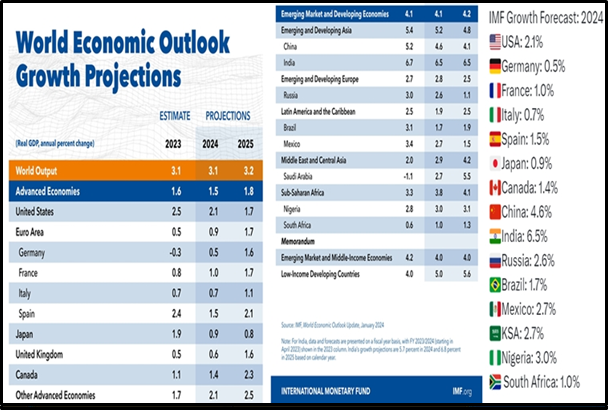IMF Upgrades India’s Growth Rate
@newsonair - IMFNews
News
- The International Monetary Fund (IMF) has raised its projection for India’s GDP growth to 6.7% for the upcoming fiscal year which if compared to its prior prediction of 6.3 percent, it is 40 basis points greater;
About the Projection
- The IMF also upgraded India’s medium-term GDP growth to 6.5 percent for the years 2025 and 2026, up 20 basis points from its October 2023 forecast, in its most recent World Economic Outlook report;
- According to the IMF:
- the outcomes show significant public investment and favorable labor market outcomes;
- India will reduce its projected current account deficit for the 2024 fiscal year from 1.8 percent of GDP to 1.6 percent;
- India will reduce its current account deficit projection for fiscal year 24 from 1.8 percent to 1.6 percent of GDP;
- India’s economy is still expanding at the fastest rate among the world’s major economies and in financial year 23, India’s GDP increased by 7.2% over the previous year.
What are Basis Points?
- In the world of finance, basis points, sometimes referred to as bps or “bips,” are a unit of measurement that represent the percentage change in the value of financial instruments or the rate change in an index or different benchmark;
- Basis points are typically used to describe shifts in bond yields and interest rates;
- Calculation of bps:
- In decimal notation, one basis point is equal to 0.0001, or 0.01% (1/100th of a percent);
- Similarly, a decimal representation of 0.015%, or 0.00015, is equal to 1.5 basis points, a fractional basis point;
- Therefore, 100 bps equals 1% and 10 bps equals 0.10%. So for example, a 25 basis point reduction in the repo rate by the RBI translates to a 0.25% decrease.
- NOTE: Divide the number of basis points by 100 to get the basis point percentage.
About International Monetary Fund (IMF)
- About:
- The International Monetary Fund (IMF) is a global financial institution that was founded with the goals of promoting international trade, ensuring financial stability, encouraging high employment and sustainable economic growth, and eradicating poverty globally;
- The goal of the 44 founding members was to create a foundation for global economic cooperation and as of right now (January 2024), 190 countries make up its membership, and 150 countries make up its workforce;
- IMF has three important objectives:
- Promoting international monetary cooperation, expanding trade and economic growth, and discouraging policies that harm prosperity;
- IMF member nations collaborate with one another and with other international organizations to carry out these responsibilities.
- World Economic Outlook report
- It is an IMF survey that is typically released in April and October twice a year;
- It examines and forecasts short- and medium-term trends in the world economy;
- The WEO Update is released in January and July in response to the increasing demand for more frequent forecast updates. The two main WEO publications are typically released in April and October;
- Major Reports of IMF: World Economic Outlook; Global Financial Stability Report.
- History of IMF:
- The idea for the IMF, commonly known as the Fund, originated in July 1944 during a UN meeting held in Bretton Woods, New Hampshire, in the United States.
- In order to prevent a recurrence of the competitive devaluations that had exacerbated the 1930s Great Depression, the 44 participating countries in that conference worked to establish a framework for economic cooperation.
- The IMF replaced gold with the U.S. dollar (gold at $35 per ounce) as the official reserve in accordance with the Bretton Woods agreement, which aimed to promote international financial cooperation. The system of convertible currencies was also created at fixed exchange rates.
- The IMF supported the system of floating exchange rates following the collapse of the Bretton Woods system (a system of fixed exchange rates) in 1971. Since each nation is free to select its own exchange system, market forces control how much each currency is worth in relation to the others and even now, this system is still in use.
- In the global economic crisis of 2008, the IMF launched major initiatives to strengthen surveillance in response to a more globalized and interconnected world and among these efforts were updating the surveillance laws to include spillovers, the phenomenon in which economic policies in one nation have an impact on neighboring ones; deepening the examination of financial systems and risks; accelerating evaluations of members’ external positions; and being quicker to address member concerns.
Source: newsonair
ABOUT Universal Group Of Institutions
Universal Group Of Institutions is the first college of its kind in Karnataka that offers: PU – Commerce & Arts; BSc Environmental Science, B. COM & BA, BA.LLB (5 Years) with integrated coaching for IAS, IPS, KAS, UPSC, PSC, CSAT, CLAT as well as other competitive exams. Additional – 30+Certificate Courses, Test Series Available & answer writing.
Why PU & Degree with Integrated Coaching?
The IAS, IPS, KAS, UPSC, PSC, CSAT & CLAT exams are highly competitive, and many aspirants appear each year. Preparing for such tough exams is like running a marathon that needs proper direction, strategy, and constant motivation right from the 10+2 level.
Through our unique Integrated program, we “Nurture and Inspire” tomorrow’s thought leaders and nation builders to excel at such competitive exams.
Know more
🌐: https://bit.ly/Admission-Open-2024
📱: +91 9686664985 / 6366816611
Disclaimer: All efforts have been made to represent India accurately and as per India government. However, Universal School of Administration, Bengaluru and its associated people do not own any responsibility for the correctness or authenticity of the same.
Please notify on the email: [email protected] if any inconsistency is found for the factual correctness.

 @newsonair - IMFNews
@newsonair - IMFNews

